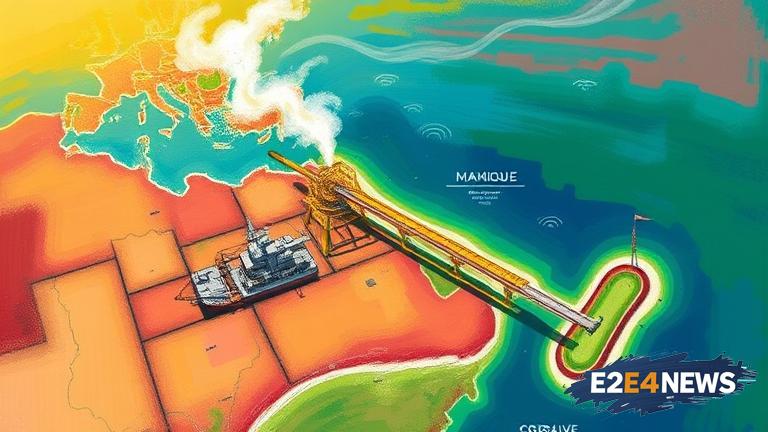The US government’s decision to provide a loan for a natural gas project in Mozambique has sparked controversy, with Senator Jeff Merkley leading the charge against the move. The project, which is being developed by a consortium of companies including ExxonMobil and Eni, aims to extract natural gas from offshore fields in Mozambique and transport it to a liquefied natural gas (LNG) terminal for export. However, Merkley and other critics argue that the project poses significant environmental and human rights risks, including the potential for oil spills, habitat destruction, and displacement of local communities. The senator has also expressed concerns about the project’s contribution to climate change, citing the significant greenhouse gas emissions that will result from the extraction, processing, and transportation of the natural gas. Furthermore, Merkley has questioned the wisdom of investing in fossil fuel projects at a time when the world is transitioning to cleaner, renewable energy sources. The loan, which is being provided by the US Export-Import Bank, has been criticized for its lack of transparency and accountability, with some arguing that it will primarily benefit the companies involved in the project rather than the people of Mozambique. The project has also been linked to corruption and cronyism, with reports of bribes and other forms of corruption involving government officials and company executives. Despite these concerns, the project has received significant support from the US government, with the Trump administration touting it as a key example of American investment in Africa. However, Merkley and other critics argue that the project is a prime example of the US prioritizing corporate interests over human rights and environmental protection. The controversy surrounding the project has also highlighted the need for greater transparency and accountability in international development projects, particularly those involving fossil fuels. In addition, it has sparked a wider debate about the role of the US in promoting sustainable development and reducing poverty in Africa. The project’s impact on local communities has also been a major concern, with reports of displacement, pollution, and human rights abuses. The Mozambican government has faced criticism for its handling of the project, including allegations of corruption and lack of transparency. The project’s environmental impact has also been a major concern, with reports of damage to marine ecosystems and the potential for oil spills. The US government has been accused of ignoring these concerns and prioritizing corporate interests over human rights and environmental protection. The controversy surrounding the project has also highlighted the need for greater scrutiny of international development projects, particularly those involving fossil fuels. In conclusion, the US loan for the Mozambique natural gas project has sparked significant controversy, with concerns about environmental and human rights risks, corruption, and the prioritization of corporate interests over human rights and environmental protection. As the world transitions to cleaner, renewable energy sources, it is essential that international development projects prioritize sustainability, transparency, and accountability. The US government must take a more nuanced approach to promoting development in Africa, one that prioritizes human rights, environmental protection, and sustainable development over corporate interests. The project’s impact on local communities and the environment must be carefully considered, and measures must be taken to mitigate any negative effects. Ultimately, the US government must prioritize transparency, accountability, and sustainability in its development projects, particularly those involving fossil fuels. The controversy surrounding the Mozambique natural gas project serves as a reminder of the need for greater scrutiny and accountability in international development projects, and the importance of prioritizing human rights, environmental protection, and sustainable development.





